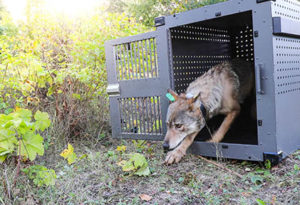The well-publicized relocation of wolves from the mainland U.S. and Canada to Isle Royale National Park in Lake Superior has been taking place without journalists on site.

Female wolf released on Isle Royale. Photo Credit: National Park Service
A newly published study coauthored by Knight Center director Eric Freedman found that coverage in the news media relied heavily on U.S. government sources, with little attention to the views and input from other sources, such as independent experts, Native American and First Nations representatives, park visitors or nearby mainland businesses.
The other authors are University of Michigan doctoral student Alexander Killion and Professor Mark Neuzil, the chair of the Department of Emerging Media at the University of St. Thomas in Minnesota.
“The Effects of Access Restrictions and Communication Strategies for Divisive Environmental Management” examined the strategies and techniques used by the National Park Service and other agencies to keep the press informed. It also looked at how news outlets covered the controversial relocations that began in fall 2018.
The Park Service cited concerns about the health and safety of the wolves and of personnel as the reason to preclude access for journalists. The agency, however, provided the press with a stream of news releases, photos and videos.
The relocations were designed to rebuild the population of gray wolves on Isle Royale at a time when only two wolves were left on the island. Scientists and natural resource managers said it was necessary to rebuilding the wolf population as an effective way to control the number of moose on the island.
The study appeared in the journal Environmental Science and Policy.
